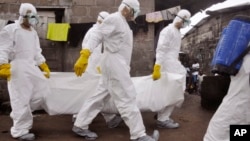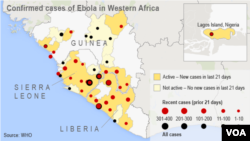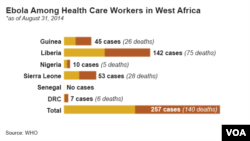The head of the World Health Organization says more and better-trained medical workers are needed in West Africa to stop the growing outbreak of Ebola.
Dr. Margaret Chan, speaking at a news conference in Geneva on Friday, said the death toll from the outbreak has climbed past 2,400, with the total number of cases rising to 4,784.
She said officials trying to contain Ebola are short of almost everything, including protective gear, mobile laboratories and body bags, but that the biggest obstacle is a lack of trained health care workers.
"Money, materials are important but those alone could not stop the Ebola transmission… Human resources is most important, and especially the needs for compassionate doctors and nurses who will know how to comfort patients despite the barriers of wearing, you know, PPG suits and working in very demanding conditions," Chan said.
The WHO said this week that Ebola has killed nearly 80 health care workers in Liberia, the country hardest hit by the disease.
Chan said more than 1,000 health care workers are needed at regional Ebola treatment centers. She welcomed a pledge by Cuba on Friday to send 165 health professionals to West Africa. The workers are scheduled to go to Sierra Leone in early October and stay for six months.
The U.S. Centers for Disease Control has also sent staff to help fight the outbreak, and the U.S. Agency for International Development is seeking qualified medical professionals to go to the region. Volunteers can submit applications at the agency's website, www.usaid.gov.
Stronger response needed
U.N. officials including Secretary-General Ban Ki-moon have warned that a stronger response is needed to contain Ebola, a vicious disease that causes vomiting, diarrhea and bleeding eyes, ears and other body openings.
U.S. government contributions toward fighting the outbreak have topped $100 million, while the private Bill and Melinda Gates Foundation this week pledged $50 million to purchase supplies and speed up development of potential therapies.
Liberia has become the epicenter of the outbreak, accounting for about half of all cases and deaths. The WHO said this week that "intense transmission" also continues in Guinea and Sierra Leone.
Guinea ramps up response
Guinea remains on alert as fresh cases of Ebola continue to surface in new areas. It’s a worrying setback, because the situation had appeared to be stabilizing in the West African country after nearly six months of response.
Infections have been reported in nine previously unaffected towns, including Madiana in upper Guinea, Macenta in the south and Forecariah and Coyah in lower Guinea. Coyah lies just 50 kilometers, or 31 miles, from the capital, Conakry, which also has new cases.
Guinean authorities blame the resurgence on Ebola patients crossing into the country from Sierra Leone and Liberia.
Ebola had been on the verge of being eradicated in Guinea, President Alpha Conde said in an address to the nation this week. “We had wanted to close the treatment center in Conakry,” the capital, when an Ebola patient arrived from Sierra Leone.
Guinea’s national Ebola coordinator, Dr. Sakoba Keita, said the country is opening 16 transit centers for suspected cases and two more treatment units for confirmed cases. Those in Gueckedou and in Macenta – both in the country’s southeast – will supplement the treatment center in Conakry.
"We want to put in place modern treatment centers so that patients can be cared for close to their homes,” Keita said.
The Ebola coordinator said all prefectures near the borders with Sierra Leone and Liberia will get Ebola transit centers, even those in areas not affected by the virus. These new measures will last for two months and will cost $11 million.
The regional Ebola outbreak began in southeastern Guinea early this year. It has killed at least 494 people in the country, including 25 health workers.
Conde announced this week that the family of each deceased health worker will receive $10,000 in death benefits.
S. African Woman tests negative
Meanwhile in Nigeria, a South African woman who was quarantined overnight as a suspected Ebola case has tested negative for the disease and will be allowed to return home, a U.S. disease expert assisting Nigerian health authorities said on Friday.
The traveler, who had flown in to Lagos via Morocco on Thursday, was held overnight in an Ebola treatment center for tests after she acknowledged suffering Ebola-like symptoms after working in Guinea and Sierra Leone since April.
The two countries, along with Liberia, are the worst affected by the largest outbreak of the deadly hemorrhagic virus to date.
The epidemic has also reached Nigeria and Senegal because of sick travelers “importing” the disease, prompting governments across Africa and the world to intensify health screening. Democratic Republic of Congo has a separate outbreak.
Dr. Aileen Marty, professor of infectious diseases at Florida International University College of Medicine, told Reuters the South African patient was treated for amoebic dysentery, which produced the symptoms of diarrhea and vomiting she had displayed on her arrival at Lagos airport.
“She is negative [for Ebola],” said Marty, who is in Lagos assisting Nigeria with its Ebola screening under WHO auspices.
The traveler, whose identity was not given, would be allowed to return to South Africa on the first available flight, she said.
The Ebola test was carried out by Nigerian medics and Dr. Cesar Munoz-Fontela of the Hamburg-based Bernhard Nocht Institute for Tropical Medicine, which has set up testing labs both in Lagos and in the southern oil city of Port Harcourt.
Ebola screening
Africa's most populous nation, Nigeria has instituted Ebola screening, including infra-red temperature scans and symptoms checks, at its airports and ports after a Liberian-American infected with the disease brought it to Lagos in July after flying from Liberia. His is one of seven deaths recorded so far out of 19 confirmed cases in Nigeria.
Ebola screening will also be carried out on thousands of Nigerian pilgrims leaving in coming days for the annual haj pilgrimage in Saudi Arabia. Saudi Arabia has barred pilgrims from Sierra Leone, Liberia and Guinea but is allowing Nigerians.
Some material for this report came from Reuters







